

Tandfonline. Fast Scholarship, Emerging Technologies and The Future of Inquiry – The post-pandemic university. Mark Carrigan and William Housley Distributed networked technologies have transformed communication, produced new forms of ‘data’ and have had a significant effect on the way in which knowledge is produced.
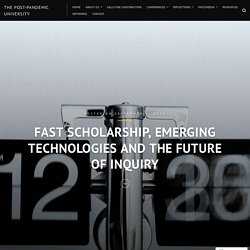
How to Write and Publish a Research Paper for a Peer-Reviewed Journal. Writing a scientific paper is an important component of the research process, yet researchers often receive little formal training in scientific writing.
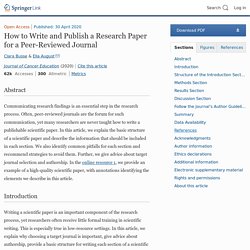
This is especially true in low-resource settings. In this article, we explain why choosing a target journal is important, give advice about authorship, provide a basic structure for writing each section of a scientific paper, and describe common pitfalls and recommendations for each section. In the online resource 1, we also include an annotated journal article that identifies the key elements and writing approaches that we detail here. Before you begin your research, make sure you have ethical clearance from all relevant ethical review boards.
Select a Target Journal Early in the Writing Process We recommend that you select a “target journal” early in the writing process; a “target journal” is the journal to which you plan to submit your paper. Identify Author Roles Early in the Process. Digital gardens let you cultivate your own little bit of the internet. Beneath the umbrella term, however, digital gardens don’t follow rules.
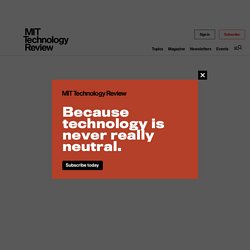
They’re not blogs, short for “weblogs,” a term that suggests a time-stamped record of thought. They’re not a social-media platform—connections are made, but often it’s through linking to other digital gardens, or gathering in forums like Reddit and Telegram to nerd out over code. Tom Critchlow, a consultant who has been cultivating his digital garden for years, spells out the main difference between old-school blogging and digital gardening. “With blogging, you’re talking to a large audience,” he says. “With digital gardening, you’re talking to yourself. OER use in the Covid pandemic. Figshare - credit for all your research.
Academic Publishing and Open Access:Costs, benefits and options for publishing research - CORE Reader. Open Education Handbook. From Lost to Belonging by Amanda Coolidge – OpenEd 2019 Keynote – BCcampus. The following is a transcript of Amanda Coolidge’s keynote for the Open Education 2019 Conference in Phoenix, Arizona, on November 1, 2019.
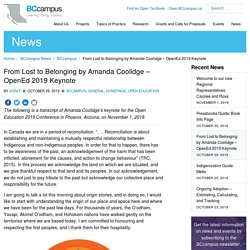
In Canada we are in a period of reconciliation. “. . . Reconciliation is about establishing and maintaining a mutually respectful relationship between Indigenous and non-Indigenous peoples. In order for that to happen, there has to be awareness of the past, an acknowledgement of the harm that has been inflicted, atonement for the causes, and action to change behaviour” (TRC, 2015). In this process we acknowledge the land on which we are situated, and we give thankful respect to that land and its peoples. In our acknowledgement, we do not just to pay tribute to the past but acknowledge our collective place and responsibility for the future. Blogging as an Open Scholarship Practice. In most of my work, I strive for openness and transparency as an open researcher and educator.
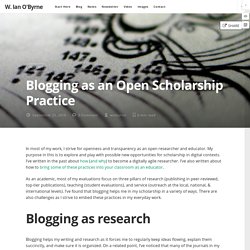
My purpose in this is to explore and play with possible new opportunities for scholarship in digital contexts. I’ve written in the past about how (and why) to become a digitally agile researcher. I’ve also written about how to bring some of these practices into your classroom as an educator. As an academic, most of my evaluations focus on three pillars of research (publishing in peer-reviewed, top-tier publications), teaching (student evaluations), and service (outreach at the local, national, & international levels). SAGE Journals: Your gateway to world-class journal research. SAGE Journals: Your gateway to world-class journal research. Textbooks are useful and ubiquitous teaching and learning resources in education (Behnke, 2018).
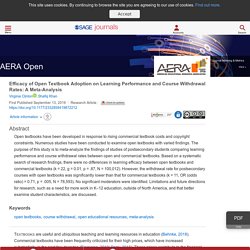
Commercial textbooks have been frequently criticized for their high prices, which have increased substantially in the past few decades (Blomgren, 2018; Perry, 2015). These prices contribute to the financial cost of education that is shouldered by taxpayers and students. As an alternative to commercial textbooks, open textbooks, which are electronically accessible without charging the user, have been developed (Smith, 2009). Many studies have examined differences in learning performance as well as course withdrawal rates between open and commercial textbooks (see Hilton, 2016, 2018, for reviews). Literature Review. Using OER courseware to improve your curriculum - Page 2 of 2.
Beyond savings, the use of this enhanced OER solution has helped faculty members track student performances with better data and analytics, improving outcomes for students and faculty alike.
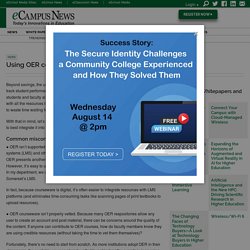
OER courseware sets students up for success by arming them with all the resources they need on the first day of class, so faculty members don’t have to waste time waiting for students to order textbooks. With that in mind, let’s take a look at a few common misconceptions about OER, and how to best integrate it into your curriculum: Common misconceptions about OER courseware ● OER isn’t supported by technology. Given the reliance on learning management systems (LMS) and other technology in the classroom, faculty members might worry that OER presents another headache to deal with (or at least a steep learning curve) . ● OER courseware isn’t properly vetted. Fortunately, there’s no need to start from scratch. Social Media in Higher Education: Case Studies, Reflections and Analysis - Open Book Publishers. To see how this book has been read around the world click here.
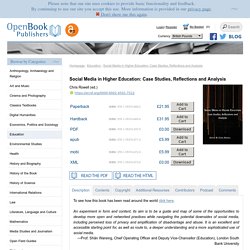
An experiment in form and content, its aim is to be a guide and map of some of the opportunities to develop more open and networked practices while navigating the potential downsides of social media, including perceived loss of privacy and amplification of disadvantage and abuse. It is an excellent and accessible starting point for, as well as route to, a deeper understanding and a more sophisticated use of social media. —Prof. Shân Wareing, Chief Operating Officer and Deputy Vice-Chancellor (Education), London South Bank University. Center for Open Science and EdArXiv Launch Branded Preprint Service for Educational Research. Charlottesville, VA The Center for Open Science is pleased to partner with open access proponents and community leaders in education to launch EdArXiv.
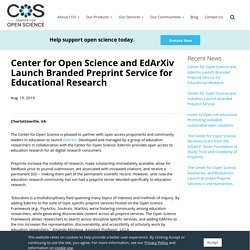
Developed and managed by a group of education researchers in collaboration with the Center for Open Science, EdArXiv provides open access to education research for all digital research consumers. Preprints increase the visibility of research, make scholarship immediately available, allow for feedback prior to journal submission, are associated with increased citations, and receive a permanent DOI – making them part of the permanent scientific record. Mapping Twitter Topic Networks: From Polarized Crowds to Community Clusters. Polarized Crowds: Political conversations on Twitter Conversations on Twitter create networks with identifiable contours as people reply to and mention one another in their tweets.
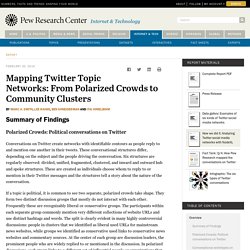
These conversational structures differ, depending on the subject and the people driving the conversation. Six structures are regularly observed: divided, unified, fragmented, clustered, and inward and outward hub and spoke structures. Myth busting: DOAJ is not inclusive – News Service. This is a myth. One of the most common criticisms levelled at DOAJ, particularly over the last 5 years, is that the index is not inclusive enough; that its coverage is poor; and that it lists only a fraction of the open access journals that exist. Our research shows that many journals reported as “missing” from DOAJ have a failed application or have been removed for not meeting DOAJ standards.
DiverseIt is true that DOAJ’s coverage is not complete but it does hold a very diverse set of journals from 130 countries. The top 10 countries with the most journals in DOAJ are a mixture from the global north and the global south. Reading, writing – and a budget line for time – Maren Deepwell. Like many, I have been inspired by posts and a conversation about writing, in particular these posts: I find it resonates with me because I, too, write all day and most of the time my audience is a folder or an upload bar.
Digital Scholarship - Google Slides. Harassment Simulation – Public Scholarship & Online Harassment. Your house is a very fine house. Generally I’m adverse to Twitter Quit Lit pieces (“How I turned off social media and learned to love life again”). I find them a) patronising (I’ve seen the truth and you poor suckers are caught in the trap), b) insulting and shallow (like when people live on minimum wage for a month and then make judgements about it) and c) egotistical (“I need to let my fans know I’m going offline, look everyone, I’m going offline!”). But with all that said, I have been thinking about social media usage, and taking more control over it recently. As the world turns ever more into a bad parody of a satire written by a nihilist on acid, we all need to find ways of managing our own self care.
Social media, and Twitter in particular, plays a not insignificant part in all this. You can only go so many days of being outraged 100 times before breakfast without it affecting you. With this in mind I am experimenting with the following: Review of Karin Tusting, Sharon McCulloch, Ibrar Bhatt, Mary Hamilton and David Barton (Eds.) (2019). Academics Writing: the Dynamics of Knowledge Creation. In tea rooms around the world, academics complain about their struggles with writing. Academics Writing: The dynamics of knowledge production (Tusting et al. 2019) is one of the very few in depth studies of how academics go about the business of writing. Specifically, the book addresses how academics manage the daily task of writing within the large, bureaucratic institutions our universities have become. Given the amount of time academics spend exploring the natural world, and the human world outside of academia, it’s somewhat surprising that studies of academic work, like the one reported on in this book, are so rare.
Existing studies of writing practice tend to focus on student learning rather than professional academic knowledge production, so this book is a welcome addition to the genre. Academics Writing is quite a slim volume organised in ten chapters. How We Write Mike Sharples. Planning on writing over the holidays? Here is how to do it Many academics use the summer holidays as a time to relax, unwind and finally get that writing project done. However, is setting aside large chunks of time over the holidays the best way to approach academic writing?
Chris Smith argues that writing over the holidays can be effective, but should be approached thoughtfully. Whereas, the holidays may seem to present a large spell of unbroken time in which to write, the way in which you approach and manage this time is just as important as its duration. Whilst the summer might seem like the perfect distraction-free time to throw yourself headlong into a stalled writing project, our research amongst academic authors suggests otherwise. Before embarking on a summer writing binge you should carefully consider your approach – here’s how. How to create a better research poster in less time (including templates) Have No Fear – Learning to love your blog. Last week I taught the third run of our Blogging to Build your Professional Profile workshop and also had the pleasure of joining a lunchtime call with colleagues from ALT to talk about different approaches to team blogging.
Something that struck me is that whenever I talk about blogging there are a number of issues that come up repeatedly, regardless of whether the people I’m talking to are experienced bloggers or whether they’re dipping their toe in the water for the first time. EDM122: Digital Literacies and Open Practice. ‘TripAdvisor’ for research aims to shake up funding model.
Plan S chief: universities, not open access push, hurting ECRs. The architect of Plan S has argued that universities are to blame for early career researchers’ concerns about Europe’s proposed shift towards open access publishing. Since being unveiled in September, Plan S has been backed by funding agencies in 15 countries across Europe and, most recently, the Bill and Melinda Gates Foundation. STI2018 paper 241. Open science prevents mindless science. On Education sur Twitter : "The idea behind @OnEd_Journal is to bring together scholars from different branches of educational research to debate urgent topics. Everyone who feels competent is invited to comment on the most recent contributions. Replies w. Finding your voice on social media. An explosion of openness is about to hit scientific publishing - Open Future. MANY scientists have championed the idea that publicly-funded research should be openly available to all, not locked away in pricey journals.
This “open access” ethos has made significant gains over the years. SCONUL welcomes UKRI commitment to open access “Plan S”. SCONUL is delighted to welcome the commitment by European funders, including UKRI and Science Foundation Ireland, to “Plan S”, a transformative development which will put real momentum behind the global drive towards full open access to research outputs. How to write a blogpost from your journal article – Advice for authoring a PhD or academic book. One of the oddest things that people in academic life regularly say to me is: ‘I’m not paid to write blogposts, only research articles. If my department or the grant-funder wants to start paying me for doing posts, then that would be a different matter’.
40 reasons why you should blog about your research. Sign IN - Open University. Communication, collaboration and identity: factor analysis of academics’ perceptions of online networking. Communication, collaboration and identity: factor analysis of academics’ perceptions of online networking Katy Jordan, Martin Weller.
Social media, the academic & the university. If you follow me on Twitter you may be aware that it’s been an eventful weekend. The Vice Chancellor of the Open University made some injudicious remarks dismissing what OU academics did as “not teaching”. Confessions of a Community College Dean. Mike Caulfield's latest web incarnation. Networked Learning, Open Education, and Digital Polarization. Open Government Licence - Canada. Fostering Democratic Dialogue with Digital Annotation. 20,000 unfairly deleted UC Berkeley lectures are now available for free.
German researchers resign from Elsevier journals in push for nationwide open access. Publishers threaten to remove millions of papers from ResearchGate. Hootsuite for academia? How to increase the visibility, downloads and impact of publications using Kudos. Social media in higher education: it's OK to fail - Efficiency Exchange.
SEB+ Digital Scholarship and my quest for evidence (and a Badge) The UK Scholarly Communications Licence – supporting academics with … Open Educational practice. Alliance Policy Using evidence v4. Sci-Hub: removing barriers in the way of science. Why scientists are fighting back. We’ve had enough of Trump’s war on facts. How and why academics should engage with social media - Pickle Jar. Keynote: Maha Bali – Hiding in the Open Home : #OER17. European Commission considering leap into open-access publishing. Networked Scholarship and Motivations for Social Media use in Scholarly Communication.
Web of science. 99 Serious Twitter Tips for Academics. » Social media for academics and the increasing toxicity of the online ecology The Sociological Imagination. Social media for research dissemination. Social Media and Digital Scholarship for Academic Research. The Digital Scholar – An analogue academic making her way in the digital world. Google@Brookes Mail Blogging for academia. Book Review: Being a Scholar in the Digital Era: Transforming Scholarly Practice for the Public Good by Jessie Daniels and Polly Thistlethwaite. Enhancing your Academic online presence using LinkedIn. Opening up Education: A Support Framework for Higher Education Institutions. Open access: six myths to put to rest. Topic 2: Managing your online identity - UOSM 2033 UOSM 2033.
Opendistanceteachingandlearning. The A to Z of social media for academia. Home - Digital Scholarship Research Guide - Library Guides at University of Washington Libraries. Social Media and Digital Scholarship for Academic Research. Digital Scholar course. TDS_1 - OpenLearn - Open University - TDS_1. A classic from @PHDcomics for #seriousacademic. Journal of Applied Social Theory. How do students access the resources they need? Survey finds only one in five obtain all resources legally. Becoming a Digital Scholar Plan. Investigar lo investigado.
P48. Research Paper, Networked Learning Conference 2016 - NLC2016, Lancaster University UK. Social Media for Academics - Mark Carrigan. Scholars in an increasingly open and digital world: How do education professors and students use Twitter? How to write a blogpost from your journal article in eleven easy steps. Enhancing your Academic online presence using LinkedIn. Reading List: Using Social Media for Research Collaboration and Public Engagement. Workspace. Society for Research into Higher Education. Scholarly behaviour and evaluation criteria: Uncovering the superficial characteristics that lead to higher citations. Being open and networked – benefits and ways forward. Philosophical Disquisitions: Can blogging be academically valuable? Seven reasons for thinking it might be. BishopBlog: Blogging as post-publication peer review: reasonable or unfair? Can Tweets Predict Citations? Metrics of Social Impact Based on Twitter and Correlation with Traditional Metrics of Scientific Impact.
How the internet changed career: framing the relationship between career development and online technologies - University of Derby Online Research Archive. Research impact: Altmetrics make their mark : Naturejobs. Creating An Academic Profile Online and Networking With Others - Careers Advice.